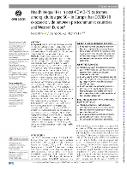Health inequalities in post-COVID-19 outcomes among adults aged 50+ in Europe: has COVID-19 exposed divide between postcommunist countries and Western Europe?

Datum vydání
2023Publikováno v
Journal of Epidemiology and Community HealthRočník / Číslo vydání
77 (9)ISBN / ISSN
ISSN: 0143-005XMetadata
Zobrazit celý záznamTato publikace má vydavatelskou verzi s DOI 10.1136/jech-2023-220771
Abstrakt
Background: COVID-19 affected people and countries disproportionately and continues to impact the health of people. The aim is to investigate protective health and socio-geographical factors for post-COVID-19 conditions in adults aged 50 years and older in Europe.Methods: Using longitudinal data from the Survey of Health, Ageing and Retirement in Europe, collected from June to August 2021, protective factors against post-COVID-19 condition among 1909 respondents who self-reported a positive COVID-19 test result were investigated using multiple logistic regression models.Results: Male adults living outside of Czechia, Poland, Hungary and Slovakia (Visegrad group, V4), who received the COVID-19 vaccination, tertiary or higher education, had a healthy weight (body mass index, BMI 18.5-24.9 kg/m2) and no underlying health condition/s, showed protective effects against post-COVID-19 condition. Health inequalities associated with BMI were observed in education attainment and comorbidities, with higher BMI having lower education attainment and higher comorbidities. Health inequality was particularly evident in individuals in V4 with higher obesity prevalence and lower attainment of higher education than those living in other regions in the study.Conclusion: Our study suggests that healthy weight and higher education attainment are predictors associated with a lower incidence of post-COVID-19 condition. Health inequality associated with education attainment was particularly relevant in V4. Our results highlight health inequality in which BMI was associated with comorbidities and educational attainment. To reduce obesity prevalence among older people with lower education, raising awareness about the risks of obesity and providing assistance in maintaining a healthy weight are needed.
Klíčová slova
COVID-19, demography, health inequalities, obesity, gerontology
Trvalý odkaz
https://hdl.handle.net/20.500.14178/1998Licence
Licence pro užití plného textu výsledku: Creative Commons Uveďte původ 4.0 International







